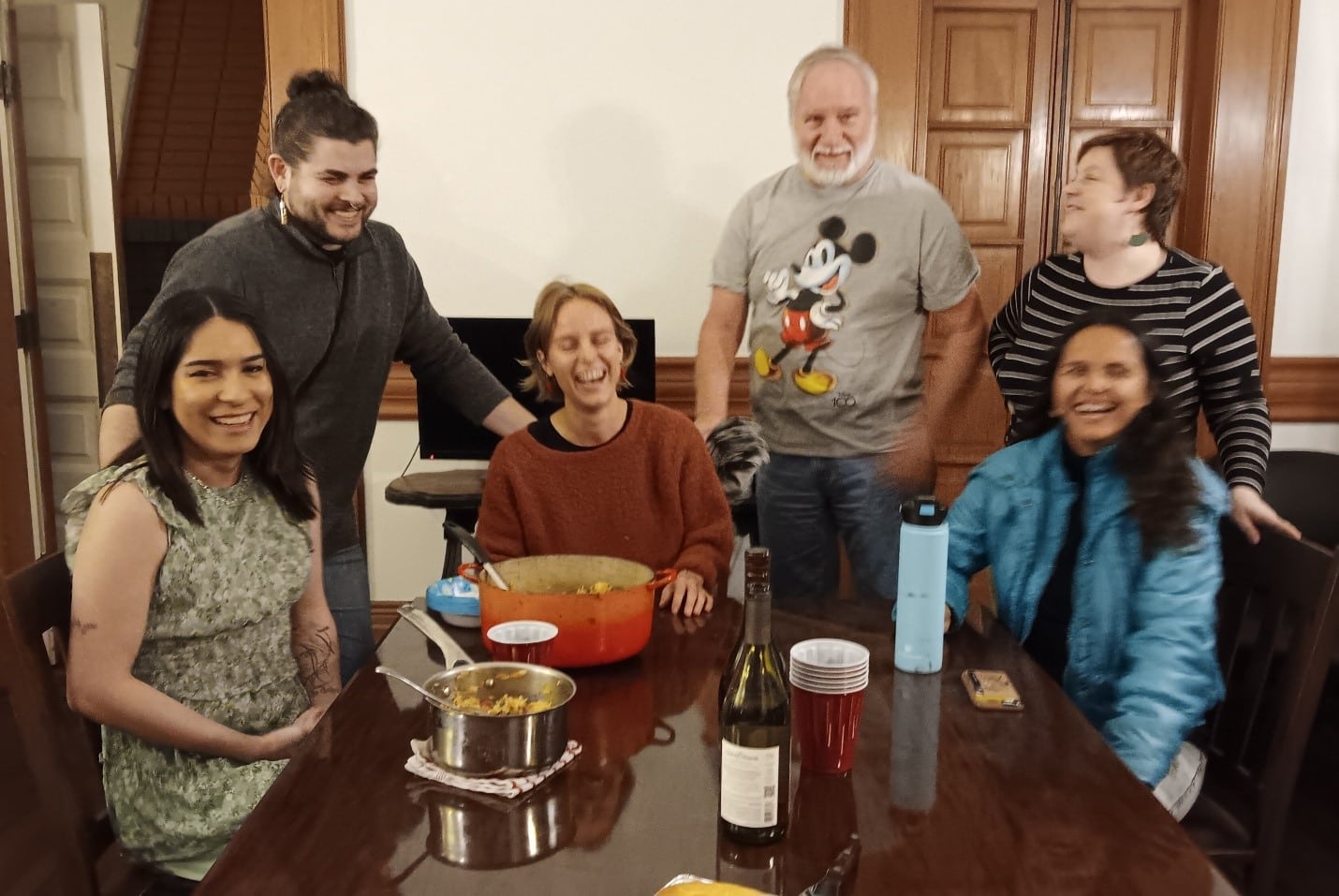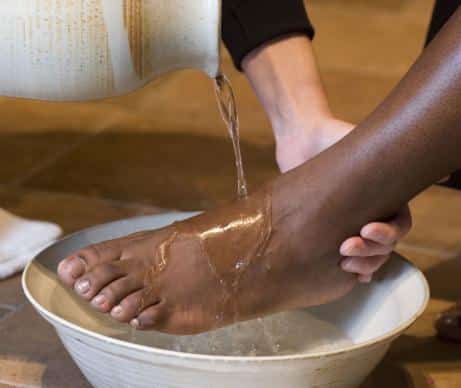 This is the final installment in a series about RISA-NOLA, a Rainbow Initiative Community (RIC) associated with St. Anna’s Episcopal Church in New Orleans. Like other groups formed under the aegis of EMM’s Rainbow Initiative, RISA-NOLA emerged as a local response to the call of The Episcopal Church to raise awareness of and provide aid to LGBTQ+ forced migrants.
This is the final installment in a series about RISA-NOLA, a Rainbow Initiative Community (RIC) associated with St. Anna’s Episcopal Church in New Orleans. Like other groups formed under the aegis of EMM’s Rainbow Initiative, RISA-NOLA emerged as a local response to the call of The Episcopal Church to raise awareness of and provide aid to LGBTQ+ forced migrants.
To learn more about the history and genesis of RISA-NOLA, its partnership with non-profit Home is Here NOLA, and participation in Pride events, check out Parts 1, 2, 3, and 4.
* * *
Navigating Change
Their joyful participation in Pride and World Refugee Day events had reinfused the RISA-NOLA leaders with optimism for the future. But as June gave way to July, they had to face some unexpected developments. First, the newest “migrant friend” they had been accompanying decided to move to another state. The RISA-NOLA team felt they needed to honor this person’s agency, despite their disappointment to see them leave. After their departure, they scheduled a time to “debrief” with Julie Ward, Executive Director of Home is Here NOLA, their partner organization. Julie reminded them that transgender asylum seekers face multiple challenges, for they need gender-affirming medical care and pro bono or low-cost legal services, as well as a community where they feel they truly belong. For these reasons, it can be tempting to move on when they do not quickly find all that they need in one place.
The RISA-NOLA coordinating committee’s conversation with Julie Ward also brought home another truth. As Claire Brooks put it, “She reminded us that in the immigration space, the landscape is always changing.” Recent changes to federal immigration policy and to partners’ priorities were bringing unforeseen change to Home is Here NOLA and therefore to RISA-NOLA’s work as well.
New Rules about Access to Asylum
 In early June 2024, the Biden administration had announced a new rule regarding the conditions under which migrants without visas or other authorization would be admitted at the U.S./Mexico border. Once the number of daily encounters with unauthorized migrants between ports of entry along that border surpassed 2,500 in a day, the border would be closed to all who did not have an appointment with USCIS (made through the CBP One app) or did not meet certain exemptions (unaccompanied minors, victims of human trafficking, and gravely ill migrants could still be granted admission). Once implemented, these conditions would apply until the number of daily encounters remained below 1500 for 7 consecutive days.
In early June 2024, the Biden administration had announced a new rule regarding the conditions under which migrants without visas or other authorization would be admitted at the U.S./Mexico border. Once the number of daily encounters with unauthorized migrants between ports of entry along that border surpassed 2,500 in a day, the border would be closed to all who did not have an appointment with USCIS (made through the CBP One app) or did not meet certain exemptions (unaccompanied minors, victims of human trafficking, and gravely ill migrants could still be granted admission). Once implemented, these conditions would apply until the number of daily encounters remained below 1500 for 7 consecutive days.
Due to the high numbers of migrants seeking entry to the U.S. at that point, the border was closed to asylum seekers on June 5. Within a few weeks, it became clear that the implementation of this new rule was significantly reducing the number of people released into the U.S. and able to seek asylum.
Despite an outcry from advocates of immigrants’ rights, the Biden administration doubled down on this rule in September 2024. They extended the timeframe for border closure to asylum seekers from one week to 28 days and changed the ways that unaccompanied minors would be counted in determining the number of “unauthorized encounters.” While this hardening of the rule was no doubt a response to the increased polarization of “border security” in the run-up to the presidential election of November 2024, it was widely denounced by many advocacy organizations as contrary to fundamental human rights under U.S. and international law.

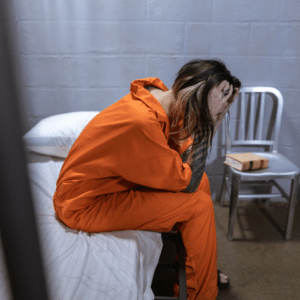
In June 2024, new barriers to seeking asylum and the announced end to a crucial program providing legal aid to immigrant detainees sent shock waves across the U.S. immigrant justice space.
A dearth of pro bono legal assistance
In early June 2024, another unforeseen change also reverberated across Louisiana and other southern states. On June 12, the Southern Poverty Law Center (SPLC), a non-profit organization headquartered in Montgomery, Alabama, announced that it was winding down one of its programs, the Southern Immigration Freedom Initiative (SIFI). SPLC immediately laid off many of the immigration attorneys who staffed it. This decision came as a shock to organizations such as Home is Here NOLA (HiHN) who were working for the release of immigrant detainees and to help them gain asylum. SIFI attorneys were the primary source of pro bono legal assistance across the southern U.S. Without their assistance, the impact that nonprofits such as HiHN could have was threatened.
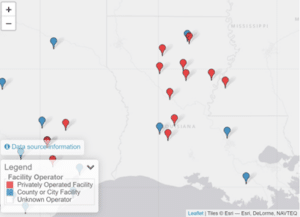
source: https://www.freedomforimmigrants.org/map
Louisiana is home to the largest number of immigration detention facilities outside of Texas. Most facilities are in remote, rural areas, making it hard for attorneys, advocates, and detainees’ families to reach them.
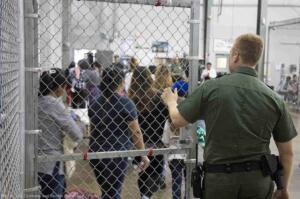
(image source: https://www.laaclu.org/ )
Most are privately owned and operated, through contracts with federal departments or agencies. As a consequence, concerns with profit often outweigh consideration for detainees’ rights.
A December 2023 report by the American Civil Liberties Union (ACLU) notes that shortcomings observed in Louisiana immigration detention facilities “exemplify the systemic issues people in immigration detention face nationwide.”
Likewise, in August 2024 a report published by Robert F. Kennedy Human Rights, ACLU and the Southeast Dignity Not Detention Coalition, based on extensive interviews with immigrant detainees across Louisiana highlights recurring issues:
- “denial of language access” (including interpretation and translated documents);
- “deprivation of human necessities” (such as potable water, minimally nutritious food, access to basic hygiene supplies, and protection from extreme temperatures);
- “abusive and discriminatory treatment” by facility staff; and
- “medical abuse and neglect.”
The August 2024 report argues that under the combined weight of these failures and abuses, immigrant detainees are denied due process.
To be clear, most immigrant detainees have committed no crime. Under U.S. federal law and intentional agreements that the U.S. has signed, people can request protection (“asylum”) only once they are on U.S. territory, and they have a right to do so, regardless of how they enter.
However, immigrants without a visa or appointment with USCIS are held in detention as a precaution while awaiting a determination on whether they qualify for asylum, out of fear that they may not show up for court hearings. They continue to be detained despite the evidence that over 80% of people seeking asylum or immigration status adjustments do appear in court at the appointed time. Unlike people convicted of a crime, immigrant detainees are held without a clear timeline; they are also held in conditions that are often detrimental to their health and well-being. Immigrant detainees have no right to legal counsel, and this often impacts their chances of receiving a favorable hearing in immigration courts. Although less costly and less overtly “punitive” alternatives to immigrant detention exist, recent U.S. administrations have focused on “deterrence” and accordingly strengthened the detention system, at taxpayers’ expense and to the profit of the private corporations who own them.
 For organizations such as Home is Here NOLA, these changes in asylum rules and the availability of pro bono legal aid were deeply consequential.
For organizations such as Home is Here NOLA, these changes in asylum rules and the availability of pro bono legal aid were deeply consequential.
With fewer asylum seekers allowed to enter the country, private immigration detention facilities were likely to be even more reluctant to allow detainees to be released to community support networks. (Without a constant and sustained influx of detainees, it would be harder for these facilities to make a profit.) And without the help of SIFI attorneys, it would be all the more difficult for the staff of non-profits like HiHN to facilitate the release of migrant detainees or to help them make a successful case for asylum, once they appeared in immigration courts.
These changes in the wider immigration space were forcing HiHN to re-examine their approach. Julie Ward announced that by the end of 2024, she would join the HiHN board but step down from the role of Executive Director, passing the baton to Lilian Alvarez, while HiHN launched a search for a new deputy director.
A Time to Reset and Rebuild Resources
For the RISA-NOLA coordinating committee, the ripple effects of these changes in the functioning of Home is Here NOLA and the immigration sector also called for introspection. As KB Lovejoy explained in late July, “We are currently taking a brief break from providing direct support to migrant friends. Instead, we are taking time to focus on building out our resources… and thinking about where we want things to go.” Unsure about what role HiHN would be able to play moving forward, the RISA-NOLA leaders were realizing that they might need to cultivate new connections with attorneys and organizations who could provide pro bono or low-cost legal services. They have met with another community resettlement group from HiHN’s network to consider ways to work more intentionally together. Cognizant of the importance of gender-affirming care for transgender newcomers, they are also looking to strengthen their ties with local non-profits focused on LGBTQ+ health services. In other words, they are working hard to adapt their initial vision of their work to the ever-shifting realities of the immigration and non-profit spaces they are now a part of.
Despite the changing circumstances and the demands of providing support for newcomers with many needs, the RISA-NOLA team remains committed to the cause. In some ways, what draws them to this work is their own experiences and identities. Both KB and Randy Lovejoy framed their commitment to this effort as grounded in an awareness of their privilege, relative to the situation of forced migrants:
KB: My driving force is both spiritual and political. I feel it’s my responsibility as an American and as a Christian to do this work. The way the U.S. has used colonization to destabilize other countries, it’s not a secret. If there’s any way I can use all the privilege I have in this life, then it should be to help others.
Randy: As someone who frequently goes out in ways seen as feminine, in a body perceived as masculine, I know how unsafe I feel and am — when you look at the news about what happens to trans- and gender nonconforming people, there is danger every time I go out…That’s how I feel in the U.S., in NOLA, and that’s one of the better, more open places to be. So, I can’t imagine how people in places with even more social conservatism may feel. I know the fear I feel with the privilege I have. So, I have even more responsibility to extend some of this privilege to people coming from places where they don’t have it and help them feel at home.
At the same time, the RISA-NOLA folks find motivation in the positive interactions they have while engaging in this work. Claire Brooks, the retired minister and ESL teacher, recalling her own days as a young social activist, had this to say:
I love to see younger people coming with their passion and creativity. It gives me hope. A lot of the things we fought for are slipping away. But I get so much energy and joy from seeing the commitment of people in this group.
Being part of a group of people who are willing to work together to overcome obstacles or deal with unforeseen circumstances is also compelling, especially when you yourself are new to the endeavor. Again, the Lovejoys:
KB: The deeper I get into this work, the deeper my faith gets, and the deeper my love for people in general gets. I feel strongly bonded with my teammates and the people we are serving. It’s hard at times, but we figure it out.
Randy: Sometimes, I feel unprepared. Things happen, and you have to respond. Then you learn from it. It’s both thrilling and fulfilling.
Recommitting to Radical Welcome
Ultimately, what enables the RISA-NOLA team to stay the course is that they see their efforts as an extension of the radical welcome that St. Anna’s as a congregation seeks to offer to all people. “All are welcomed, none are shunned” is the motto that figures prominently on the church’s website and in its latest welcome video.
Given how frequently faith-based organizations unapologetically reject people who do not conform to heterosexual norms and gender binaries, a congregation that is LGBTQ+ affirming not only in words but in actions stands out. Recalling their first days at St. Anna’s, KB Lovejoy emphasized the singularity of this commitment:
It was Pride week, back when Father Bill was our rector. He was all fired up and talking about how, if we want to be Christ-like, we are to embrace our queer siblings. That really struck a chord with me, and I kept coming back.
And I got to see pretty quickly how deeply this congregation loves this community, and is so incredibly motivated to extend love and care to everyone that they meet… That is something about St. Anna’s that makes it so special, that they walk the walk! They are out there doing things that are so important.
Walking the walk can mean providing food for hungry neighbors, offering a safe and stimulating environment for kids outside of school hours, or extending a genuine and generous welcome to LGBTQ+ newcomers seeking protection from persecution and the support needed to feel at home in an unfamiliar place.
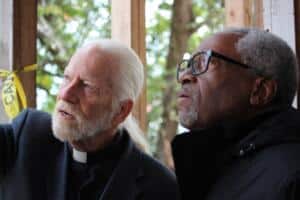

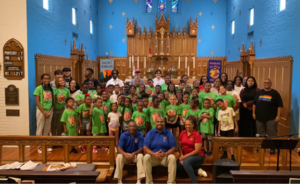

Fr. Bill Terry (left) explains to The Right Reverend Michael Curry, Presiding Bishop of the Episcopal Church, St. Anna’s commitment to building an inclusive community during a 2022 visit to Dodwell House — the home of the Anna’s Place program, also shown above. The image of an ever longer table where all are welcome continues to guide and inspire the clergy and people of St. Anna’s Episcopal Church, as they walk the walk.
Moving forward
In August 2024, RISA-NOLA was awarded a Rainbow Asylum Ministry grant from EMM. This grant of $3000 will enable RISA-NOLA to expand its resources and continue to provide direct aid to LGBTQ+ asylum seekers in Louisiana. Grantees also receive personalized training and technical assistance as they develop their ministry.
One of the things that the group is already planning for the fall is a six-week adult formation series focused on The Episcopal Church’s responses to immigration and global migration, as informed by scripture, tradition and liturgy. The series will culminate with a special “migration mass” planned to coincide with the feast day of St. Francis Xavier Cabrini, an Italian-American nun who worked with immigrants in the U.S., including in New Orleans and is now known as the patron saint of immigrants. The RISA-NOLA coordinating committee is working with St. Anna’s new rector, the Reverend Allison Reid, to plan this series and the culminating “migration mass.” While recognizing that RISA-NOLA took shape largely before she began serving as St. Anna’s rector, Rev. Reid had this to say:
I offer my full support for the ministry going forward. I am continually inspired by the dedication of our RISA-NOLA members. Through this work, we hope to share the love of Christ with the most vulnerable in our community.
As the last part of this series was being finalized, EMM received an update from folks at St. Anna’s. Outraged by the overt xenophobia and racism of some political candidates towards Haitians who were legally working and living in Springfield, Ohio, members of the church had decided to make a quilt, to share a message of solidarity and support for immigrant newcomers in another community, across the country. “Whatsoever you do to the least of these, that you do unto me,” was Jesus’ message of radical love. This is a love that, as the St. Anna’s community knows and shows, should encompass all of our neighbors, regardless of where they come from, the languages they speak, or the people they love.
In just one year, the RISA-NOLA team has formed itself, raised funds, established partnerships, honed critical skills, welcomed and accompanied newcomers, spread awareness of the unique vulnerabilities of LGBTQ+ asylum seekers, successfully applied for external funding, and adapted to the vagaries of a volatile context. While there’s no telling what awaits them or any of the Rainbow Initiative Congregations or Communities in the year to come, we at EMM are deeply grateful to RISA-NOLA and the congregation of St. Anna’s for their ongoing participation in and commitment to our shared ministry. We will all be eager to see what comes next.
* * *
Want to learn more about EMM’s Rainbow Initiative? Check out the congregational toolkit and other resources here.



